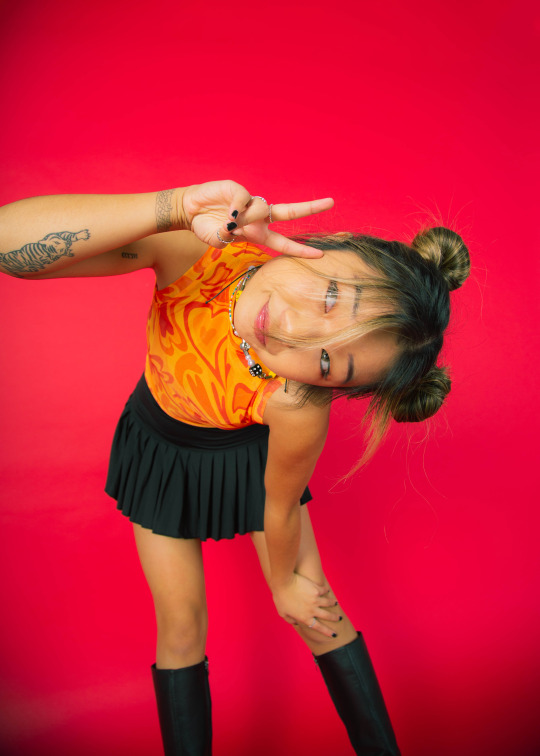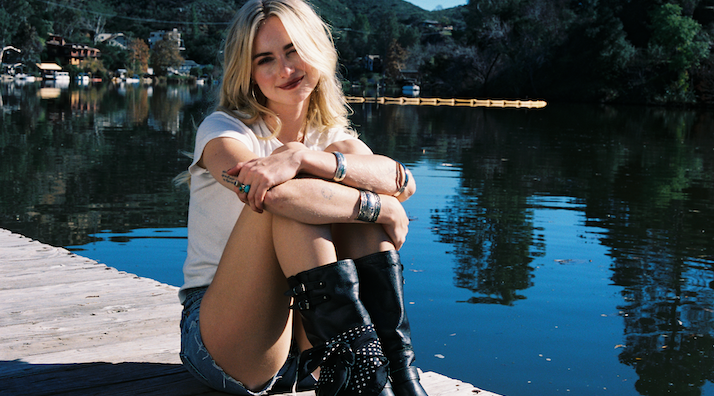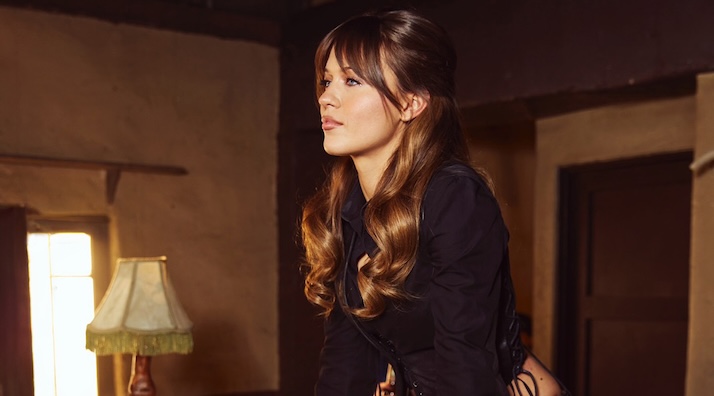Tiffany Day Has Found Herself [Q&A]

Photo: Ally Wei
Once upon a time in Wichita, Kansas, there lived a YouTube sensation who had a clever nickname for all three of her guitars. She introduced herself to the internet as Tiffany Day, an adolescent R&B singer who by her own account "grew up questioning her facial features" because she "didn't look like anyone on TV." With a propensity for curating bedroom pop songs and cover versions of Top 40 music, she gained a considerable amount of fanfare on YouTube.
Yet, Tiffany had California dreams. But to an Asian American teenager, living in Middle America a few years before the emergence of a prominent AAPI based record label like 88rising, she wasn't sure if talent alone would ever be enough for her to achieve mainstream success. Representation seemed like a far-fetched fairy tale. But on March 27, 2017 that narrative changed, because that's the day when a candid video of Tiffany on a holiday vacation in Italy surfaced on Twitter. Tiffany was seen singing "Hallelujah," while staring down into a wishing well. The heartwarming clip only lasted 48 seconds, but it circulated the internet in a matter of days and soon went viral. More importantly, the overall reception to the video gave her new hope. Suddenly, Tiffany's desire to pursue a music career in LA returned.
So naturally, she did what any ambitious 18-year-old would do; she made a deal with her parents. The terms of the verbal agreement stipulated that she could move to Los Angeles to chase her dreams as long as she agreed to enroll in a University upon her arrival. What happened next was the adventure of a lifetime. Tiffany's social life as an underclassman in a whole new environment would go on to become the inspiration behind the making of her first two EPs, The Recovery Project and The Dependency Project, and the declaration of her childhood ambition.
Fast forward to the present day, where the escapades of Tiffany Day's three years as an underclassman on campus can be heard far and wide at a number of her headlining shows. Tiffany Day's music resonates in a manner similar to tracks created by soul singers like Kali Uchis and alternative pop musicians such as BENEE. Break-up songs like "Commitment Issues" emit heavy components of neo-soul, while her latest single, "Clouds," is a strong display of her ability to reach down into the depths of her soul in order to create a composition that is empowering, lovelorn, and introspective.
"I'm a senior now in college. It's crazy how time really just flies," says the multi-instrumentalist. "It was hard to balance the two, when I first got into school. But eventually, it became a really good system for me because if you come out to LA as an artist and that's your sole focus, I feel like it just becomes very stressful and there's a lot of pressure. But because I have this role of being a student as well, I feel like I've gotten all of the inspiration and experience from being a college kid and I could use that to write about life's problems in my music."
Tiffany Day has certainly come a long way from Kansas. Now, an LA transplant who has already opened up for multi-platinum artists like Surfaces, her star is on the rise and she's just getting started. To celebrate the release of her latest single "Clouds," we caught up with the 21-year-old songstress to talk about the making of her latest single, her first sold-out show in Los Angeles, the reason why she names all of her guitars, and the way in which her career has inspired a younger generation of Asian American teenagers who feel the same way about their identity as she once did.
Ones to Watch: This has been a major year for you. You sold out your first headlining show at Los Angeles' Moroccan Lounge. How would you summarize that evening?
Tiffany Day: It was overwhelming, and I loved every second of it! I was really nervous about the show, but as soon as I walked out on stage and heard how many people were excited to see me, all of that just disappeared... I remember someone showing me a video of the line outside of the venue. The whole time I was just thinking, "All these people literally came here because they like my music and they like me." I just couldn't wrap my head around that. I was nervous that nobody would know the words to my songs. A couple times during rehearsal, there would be certain points where I'd want to aim the mic at the crowd but then I'd be really nervous and think to myself. "What if the crowd doesn't know the words?" But when I got out there, everyone was singing along. Instantly! They knew every single word. It was a really sweet night!
What was it like hearing your fans sing along to your songs?
I was shocked. I really wasn't expecting it all, because I played a show before this one and no one knew who I was. I was part of a lineup and there were probably about thirty people who showed up. It was my very first time on stage as Tiffany Day. I was very nervous and after that show was over, I kind of got the impression that it was what all shows were probably going to be like. So, when I walked inside and there were like two hundred people yelling my name and screaming the words to my songs. I thought to myself, "What the fuck is this?" (laughs) It was touching and it made me realize how powerful of a position that I am in to be able to write music that inspires and impacts people.
When it comes to doing a live show, you're likely to play the electric guitar, acoustic guitar, ukulele, and piano, not to mention your dancing. In a perfect world, what would your ideal set look like?
I would want a huge variety. I think if I had an hour-long set with a big-ass budget, there would be some songs with cool choreography, backup dancers, and a wireless microphone draped over my face. And then there would be slower songs with just me and my acoustic guitar. There'd also be some upbeat songs with the full band. I'm also really into electronic music. So, I think it'd be sick if maybe there was an instrumental break of some sort where I could DJ a little set and people could dance in the crowd.
Three weeks after your sold-out show at the Moroccan Lounge, you opened up for Surfaces. How did you land on the radar of such a popular band after having only played two live shows beforehand?
My agent had been talking about a potential opportunity to open for Surfaces in Texas. When I got an email confirming the show I started freaking out (laughs). I was really excited for it! I actually listen to Surfaces. But I was not prepared for the Texas heat when I got there. Things were not working out at first. My drummer runs all of our backing tracks on his laptop computer, but because it was so hot outside, his computer started overheating. We were doing soundcheck outside in what felt like 100-degree weather. I was kind of panicking about it. But then everyone improvised and we got ice packs for the laptop and eventually, it became a really nice set. The show was a really great learning experience and the band members from Surfaces were really nice.
We heard that you bought a brand-new guitar on the same day of that performance. Why do you give nicknames to every guitar that you own? And would you mind giving our readers an introduction to your collection?
I have three guitars! My first guitar is an acoustic Ibanez guitar that was given to me for free by my older brother, when I was fifteen. It became my first true love when it comes to instruments. Her name is Kaia and so many tears have run over that piece of wood. My second guitar is called TOFU. It was my first [Squire Stratocaster] electric guitar. I made it a point to spell his name in capitals for some odd reason. I think I was having tofu for dinner that night when I got him and so it just came to me really naturally. My last guitar and the newest addition to the family is a baby yellow Fender Stratocaster guitar named Yolk. This had been my dream guitar for a while, but I always felt like I didn't deserve it quite yet in terms of skill. When I went to Texas to open for Surfaces, I realized that I never actually brought a guitar. So, I went to the nearest Guitar Center in Dallas and there she was. She was hanging up with all the other guitars right as I walked in. I name my instruments because it strengthens my personal connection to them. I've always had a weird thing for naming inanimate objects. It just makes me feel like they are really mine and it makes me feel more of a responsibility to take care of them as if they were my children.
In addition to playing live shows again, you've dropped two EPs this year, The Recovery Project and The Dependency Project. Did the COVID lockdown play a major role in your creative output this year?
The original plan was to have four EPs out this year and it looks like only two are coming out. But the third one and the fourth one will be out next year. During the COVID lockdowns, I obviously stopped going to the recording studio because that was pretty much impossible. I also went back home for a bit. When I was home, my mom had me quarantine in the basement for 14 days (laughs). I was down there with literally nothing but my guitar and my phone. So, it really forced me to just start writing music. During that time, I was also in a really weird long-distance relationship with this man… I don't even want to get into it right now. He was just not a good man, but he gave me lots of content to write about. Through that experience, I feel like I made some really vulnerable shit about my situation and that's how The Dependency Project came about.
Let's discuss The Recovery Project for a minute here. I feel like that EP had a very serious and retrospective undertone, especially when it comes to tracks like "Vulnerable" and "Pretend."
Both of them were about guys that I had baby crushes on during my freshman year. Those two songs were the only two songs from that EP about boy crushes. The other three songs on that EP sounded like they were about someone. But "Take Me Back" was actually written about being taken back to the days when I treated music like it was purely a hobby and I didn't have to worry about whether a song would sound good or not. And then, "Feel Alright" was about me feeling really lost because of social media. During my freshman year, I really struggled with finding who I was as an artist. It was really hard for me because I had been trying all of these different looks and I didn't even know what I should be posting. I was trying to make the transition from being labeled a YouTuber and a cover artist to an actual recording artist that people would respect. That was hard because I didn't even know who that artist was supposed to be yet. So, "Feel Alright" was about that whole thing and "Homesick" was about the growing pains of leaving a chapter of my life and kind of wanting to go back.
The Dependency Project feels more like I'm listening to the words of a bachelorette who just re-introduced herself to the dating world, again, especially when it comes to songs like "If You Don't Text First," "Calone" and "Night W U." Is that an accurate depiction?
Yeah, I would say so. The Dependency Project was almost like therapy for me - writing those songs. I had never really planned on making those songs into a project. I was really upset with this boy that I was with at the time and the only way that I could feel better about it was to write about it. Eventually, I took a step back and I was like, "Woah, every song fits the same theme." So, that's kind of how the project came about.
Your brand-new single comes out today! Walk us through the writing process and inspiration for "Clouds ."
“Clouds" was made with one of my really good friends, a producer named Cooper Holzman. I came into the recording session with references of another song, and it's funny because our song ended up sounding way different. The writing process itself wasn't too emotional but the words felt right. It felt like my ultimate closure song. I just got out of a really toxic relationship and felt like I couldn't forgive myself for staying. I kept questioning what I even learned from the mess. I think I realized that I didn't need closure from another person, but I was supposed to create my own. So, I did it in a song! The lyrics talk about how I discovered self-love and respect. It's a promise to myself to never let someone treat me like that again. I felt so amazing after finishing it. I remember we were sitting on it for a while and something was just missing. Then Coop played this crazy low dark synth and I screamed. I actually screamed at him! That specific sound was everything. It felt scary, powerful and beautiful - all at the same time. It made my body just want to convulse and that's when I knew the song was finally coming together. It's probably one of the most rewarding moments so far in the creation process of my career.
Recently, we've seen a very significant growth, in terms of visibility and notoriety, for Asian and Asian American artists in mainstream pop music. As a child, when you first discovered that you wanted to be a professional singer, how possible did you think that dream was? And how encouraged are you now, with the emergence of recording artists like Rich Brian, Joji, and record labels like 88rising?
When I was younger, my mother would sometimes say, "You have an amazing voice and amazing talent. Everything is there. If you were blonde or brunette and you fit the conventional beauty standards of this country, you would have so much of a higher chance." I thought about that for a while. And I realized that she never meant that in a mean way, but there is so much truth in that statement. So, for a while I was very discouraged about the whole thing. Not just because I was Asian but also because I grew up in Kansas. Sometimes I thought that I would never get an opportunity. So, around my junior year, I actually thought about completely giving up on music and going to the University of Michigan to study biomedical engineering. That was the plan, but then I had this music video go viral, and I realized that my music would be so much bigger with an audience and I'd have a much better chance to break into the industry. I feel like there are two things that sell in the music industry: your beauty or your clout. As sad as that is, it's kind of the truth. I realized that I had the second option covered. That's when my entire course changed. So, I made a deal with my parents about moving to L.A. if I stayed in college.
And as soon as I got out here, all of these Asian artists like Rich Brian and Joji started popping off. So, at that point, I became very excited about the whole thing. This past year has been such an exciting time! Asian American artists and influencers are being more accepted by Hollywood. A lot of my supporters are Asian American. I love that! Because I feel like it's working. Being able to represent my people and my culture is really important to me. I want to be someone that they can look up to. So, I feel a lot more hopeful than I was when I was a little kid. That's for sure.
With that being said, what kind of impact do you think your career is having on the younger generation of aspiring musicians from the AAPI community?
I'll always remember this one experience that I had with a fan. I flew to Pittsburgh a couple of months ago to play a gig and afterward I did a meet and greet. I had given everyone hugs and I was talking to everyone, when this girl came up to me, practically on the verge of crying. She gave me the biggest hug and said, "You have no idea how much your music got me through high school." I was about to start crying too, it really touched me. I talked with her for a bit and that was the moment that I said to myself, "This is the reason why I do this shit!" Even though I didn't know this girl and we live across the country from one another, the fact that I was able to help her through some tough years means so much to me. My chosen purpose in life is to help people and make them feel better. Even if it's just one person. Because one person's life is huge.



-1771017647.jpg)